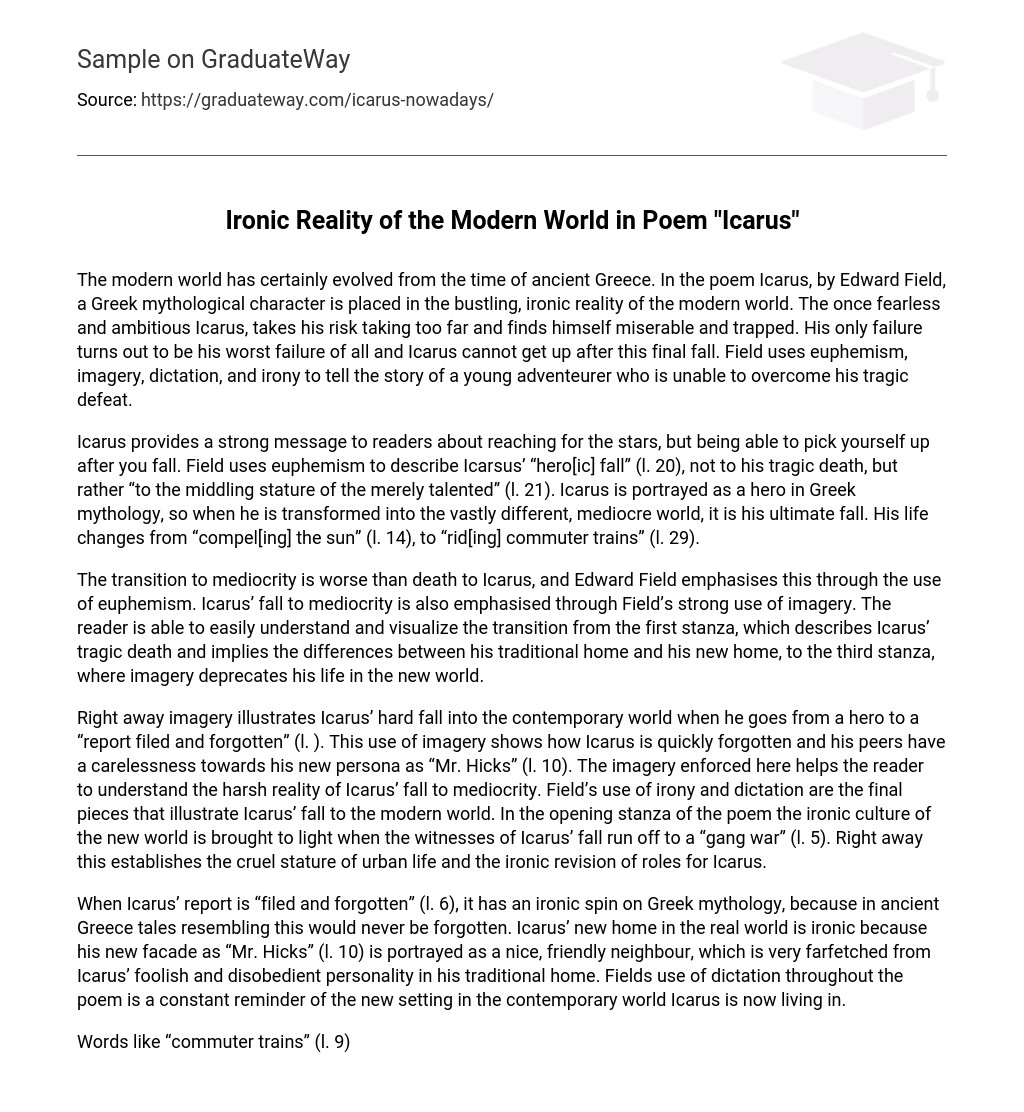The modern world has certainly evolved from the time of ancient Greece. In the poem Icarus, by Edward Field, a Greek mythological character is placed in the bustling, ironic reality of the modern world. The once fearless and ambitious Icarus, takes his risk taking too far and finds himself miserable and trapped. His only failure turns out to be his worst failure of all and Icarus cannot get up after this final fall. Field uses euphemism, imagery, dictation, and irony to tell the story of a young adventeurer who is unable to overcome his tragic defeat.
Icarus provides a strong message to readers about reaching for the stars, but being able to pick yourself up after you fall. Field uses euphemism to describe Icarsus’ “hero[ic] fall” (l. 20), not to his tragic death, but rather “to the middling stature of the merely talented” (l. 21). Icarus is portrayed as a hero in Greek mythology, so when he is transformed into the vastly different, mediocre world, it is his ultimate fall. His life changes from “compel[ing] the sun” (l. 14), to “rid[ing] commuter trains” (l. 29).
The transition to mediocrity is worse than death to Icarus, and Edward Field emphasises this through the use of euphemism. Icarus’ fall to mediocrity is also emphasised through Field’s strong use of imagery. The reader is able to easily understand and visualize the transition from the first stanza, which describes Icarus’ tragic death and implies the differences between his traditional home and his new home, to the third stanza, where imagery deprecates his life in the new world.
Right away imagery illustrates Icarus’ hard fall into the contemporary world when he goes from a hero to a “report filed and forgotten” (l. ). This use of imagery shows how Icarus is quickly forgotten and his peers have a carelessness towards his new persona as “Mr. Hicks” (l. 10). The imagery enforced here helps the reader to understand the harsh reality of Icarus’ fall to mediocrity. Field’s use of irony and dictation are the final pieces that illustrate Icarus’ fall to the modern world. In the opening stanza of the poem the ironic culture of the new world is brought to light when the witnesses of Icarus’ fall run off to a “gang war” (l. 5). Right away this establishes the cruel stature of urban life and the ironic revision of roles for Icarus.
When Icarus’ report is “filed and forgotten” (l. 6), it has an ironic spin on Greek mythology, because in ancient Greece tales resembling this would never be forgotten. Icarus’ new home in the real world is ironic because his new facade as “Mr. Hicks” (l. 10) is portrayed as a nice, friendly neighbour, which is very farfetched from Icarus’ foolish and disobedient personality in his traditional home. Fields use of dictation throughout the poem is a constant reminder of the new setting in the contemporary world Icarus is now living in.
Words like “commuter trains” (l. 9) and “committees” (l. 30), constantly clarify and emphasis the mediocre setting. Field strongly employs techniques of euphemism, imagery, irony, and dictation. In doing so, he conveys both poetically personal reflections and an effective change of Icarus’ setting, shaping this work as an even more tragic story for the protagonist than his death would have been. Icarus provokes the reader to self reflect on their attempts to reach the heavens and their abrupt fallings. It is a reminder to us that no matter how hard you fall, nothing will beat the pain of giving up.





